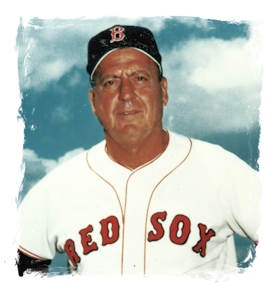 |
Billy Herman was born on July 7, 1909, in New Albany, Indiana. He attended New Albany High School, but playing in the major leagues was the farthest thing from his mind. At the conclusion of his junior year, Billy dropped out of high school to work in a Louisville veneer manufacturing plant. He was playing baseball for the New Covenant Presbyterian Church team in Louisville when he was signed by the general manager of the Louisville Colonels, a Class AA club in the American Association. The Colonels sent him down to Class B Decatur, but he was returned to Louisville within a few days without even seeing the diamond and was sent to Vicksburg-a class D town, as low as you can be sent. He returned to Louisville in 1929. In spite of his self-deprecating approach to his abilities, statistics show that he was a solid batsman in his minor league career. He was purchased by the Chicago Cubs in August 1931. In 1932, Billy batted .314 and in 1933, he accounted for 466 putouts at his keystone position, the NL record. In June at Philadelphia, he tied a N.L. record with 11 putouts in a nine-inning game. In 1934, he was selected to his first All-Star Game. It started a string of 10 straight times that Billy participated in the mid-summer classic. He was gaining a reputation as a good, smart, aggressive ballplayer, whether at bat or in the field. The 1935 season may have been Herman’s best, as he led the league in hits, doubles and sacrifice hits while batting a career-high .341. Over the next couple of years, he established himself as the top second baseman in the senior circuit. He was without peer in the field and at the plate he topped .300 in six of his first eight seasons as a starter. In 1941, he was traded to Brooklyn. If there was ever a concern that he was slowing down, those thoughts were put to rest in 1943 when he batted .330 and incredibly drove in 100 runs, a career high. With World War II in full swing, players were starting to be called up to serve their country. Billy was classified 1-A and enlisted in the United States Navy. After his initial training at Great Lakes Naval Station, he was sent to Pearl Harbor, where he spent much of his time playing baseball on base teams located on the Pacific Islands, missing the 1944 and 1945 seasons. In June 1946 Billy returned and was dealt to the Boston Braves. In September 1946, he was on the move again, part of a seven-player deal that sent him to Pittsburgh. There, he signed a two-year contract as a player-manager. Under him, the Bucs went 61-92. They finished 32 games behind first place Brooklyn and Billy resigned in September 1947. He was not deterred by his managing experience in Pittsburgh. He spent the next 16 seasons either managing in the minor leagues or coaching in the majors. With two games left in the 1964 season, Billy replaced Red Sox skipper Johnny Pesky on an interim basis. He was given the head job for the 1965 and 1966 seasons. But the Red Sox finished 40 games back of first-place Minnesota in 1965. The 1966 season was no better, and with the Red Sox battling the Yankees, Senators and Athletics for the basement of the American League. Billy was fired in September 1966. He resurfaced as a coach for the California Angels in 1967, then moved to northern California and scouted for the Athletics from 1968 to1974. He returned to coaching, joining Roger Craig’s staff in San Diego for the 1977 and 1978 seasons. Billy Herman retired with a career batting average of .304 and was inducted into the National Baseball Hall of Fame by the Veterans Committee in 1975. He passed away as a result of cancer on September 5, 1992, at age 83, in West Palm Beach, Florida. |
|||||
